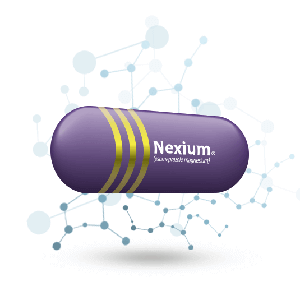PPI Side Effects
 Patients generally tolerate proton pump inhibitors like Nexium® (esopremazole), Prevacid® (lansoprazole), Prilosec® (omeprazole) and Zegerid (omeprazole and sodium bicarbonate) quite well for a month or less. However, patients on long-term PPI therapy for gastroesophageal reflux disease, ulcers and other conditions from excessive stomach acid production may risk serious health complications and other adverse effects. Of course, these risks and complications vary based on usage and active ingredient. Learn which PPI side effects you may experience without realizing it below.
Patients generally tolerate proton pump inhibitors like Nexium® (esopremazole), Prevacid® (lansoprazole), Prilosec® (omeprazole) and Zegerid (omeprazole and sodium bicarbonate) quite well for a month or less. However, patients on long-term PPI therapy for gastroesophageal reflux disease, ulcers and other conditions from excessive stomach acid production may risk serious health complications and other adverse effects. Of course, these risks and complications vary based on usage and active ingredient. Learn which PPI side effects you may experience without realizing it below.
PPI Side Effects: Most Common Temporary Adverse Reactions
Since proton pump inhibitors are among the most potent drugs available for suppressing gastric acid production, they’re highly attractive for managing GERD-associated heartburn. PPIs also encourage speedy erosive esophagitis healing. PPIs and antibiotics are often combined to treat gastric ulcers caused by H. Pylori bacterial infection. Short-term PPI medication courses last approximately 4-8 weeks and may cause these side effects:
- Headaches
- Nausea
- Vomiting
- Stomach/abdominal pain
- Gas
- Diarrhea
- Constipation
- Skin rashes
Proton pump inhibitors won’t immediately relieve occasional heartburn symptoms. For this reason, individuals who don’t have a diagnosed condition caused by excessive stomach acid production would be better off choosing a traditional remedy, such as Alka-Selter or Pepto-Bismol. Alternatively, try using a lower class of drug called H2 blockers for treating acid reflux. Zantac (ranitidine), Tagamet (cimetidine), Pepcid (famotidine) or Axid (nizatidine) are usually available in any drug or grocery store.
Timeline of Serious PPI Side Effects and Health Complications
Doctors typically treat more serious GERD cases, multiple endocrine adenomas, Zollinger-Ellison Syndrome and systemic mastocytosis with PPI maintenance therapy. Since many PPI drugs are now sold over-the-counter in generic form (omeprazole, esomeprazole and lansoprazole), consumers may be unaware that prolonged use can have more serious risks.
One recent study in the Journal of the American Society of Nephrology showed patients prescribed PPIs for 1-2 years are three times as likely to suffer from kidney failure than those taking them for a month or less. Further, patients on PPI drug therapy for up to five years have a 96% increased risk of kidney failure. When researchers compared patients taking any proton pump inhibitor with those prescribed H2 blockers for heartburn relief, 28% more individuals taking PPIs developed chronic kidney disease than those on H2 blockers did. Yet another study published on Jama Internal Medicine‘s site found a correlation between long-term PPI use and a 20-50% increase in developing chronic kidney disease. However, no direct causal link between PPI drugs and kidney disease currently exists.
Serious PPI Side Effects Linked to Off-label Use or Overuse
PPIs are among the most commonly prescribed drugs in the U.S. and sold everywhere in OTC form. As a result, patients now report more serious life-threatening conditions after prolonged use. Some serious health conditions linked with regular PPI use after two years include:
- Acute interstitial nephritis (AIN)
- Kidney failure
- Chronic kidney disease (CKN)
- Spontaneous bacterial peritonitis
- Small intestinal bacteria overgrowth
- Traveler’s diarrhea
- Vitamin B12 and/or magnesium deficiency
- Pneumonia
- Clostridium difficile infection (C. Diff)
- Increased risk of osteoporosis-related bone fractures in the hip, wrist or spine
- Unusual bleeding or bruising, including bloody stool
If you suffered any of these adverse reactions, talk to your doctor. You may benefit from proton pump inhibitor alternatives with fewer side effects (like H2 blockers). Antacids and H2 blockers can often effectively treat occasional heartburn, indigestion or gastric ulcers.
PPI Side Effects: Increased Dementia Risks in Elderly Patients?
In a recent German study, older PPI patients showed a 44% increased dementia risk compared to non-PPI patients. However, researchers couldn’t draw a direct cause-and-effect link between long-term PPI use and cognitive decline. PPI drugs seem to decrease amyloid beta and tau protein levels, which are associated with Alzheimer’s disease. In addition, regular PPI use can cause vitamin B12 deficiency. This also may contribute to dementia’s characteristic loss of memory and ability to reason. Dr. Malaz Boustani, American Federation for Aging Research spokesman, says Tagamet, Pepcid and Zantac aren’t good alternatives for older acid reflux patients. That’s because earlier studies showed H2 blockers could increase older patients’ dementia risk.
Until doctors find a good alternative treatment or direct causal link between PPIs and cognitive decline, researchers should conduct more randomized clinical trials in elderly populations, says study author Britta Haenisch. “Clinicians should follow guidelines for PPI prescription, to avoid … inappropriate use,” cautions Haneisch, who works at the German Center for Neurodegenerative Diseases in Bonn. Notably, estimates believe that doctors write up 70% of U.S. PPI prescriptions for minor acid reflux or heartburn. For this reason, around 25% of PPI patients could be weaned off altogether without suffering increased pain or other side effects.
If you believe you have undiagnosed PPI side effects, talk to your doctor about weaning off these drugs. Your PPI side effects may also qualify you for financial compensation from the drug’s manufacturer. To check your eligibility for a cash settlement online, click the button below now.
Check your eligibility for compensation.
If you or a loved one has suffered from serious complications after taking Nexium, Prilosec or another PPI medication, you may be entitled to compensation from the manufacturer. Request your free case evaluation now to see if you may qualify.
Lori Polemenakos is Director of Consumer Content and SEO strategist for LeadingResponse, a legal marketing company. An award-winning journalist, writer and editor based in Dallas, Texas, she's produced articles for major brands such as Match.com, Yahoo!, MSN, AOL, Xfinity, Mail.com, and edited several published books. Since 2016, she's published hundreds of articles about Social Security disability, workers' compensation, veterans' benefits, personal injury, mass tort, auto accident claims, bankruptcy, employment law and other related legal issues.




